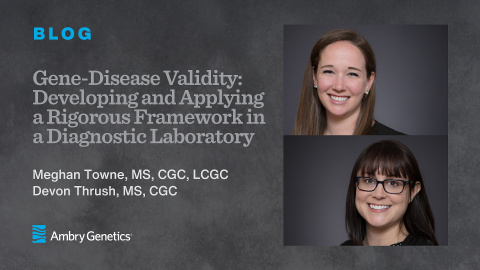- By Carrie Horton, MS, CGC
- Posted May 30, 2024
Research Recap: Determining Gene-Disease Validity in POT1 Tumor Predisposition
Germline variants in POT1 have been implicated in predisposition to melanoma, sarcoma and glioma. However, these tumor associations have been derived from very small studies, or those with cohorts highly ascertained for specific cancers. In our recent study in Genetics and Medicine regarding POT1 tumor predisposition syndrome, Ambry set out to…
- By Meghan Towne, MS, CGC, LCGC
- Posted May 2, 2024
Gene-Disease Validity: Developing and Applying a Rigorous Framework in a Diagnostic Laboratory Setting
Our understanding of genes and diseases is constantly evolving. At Ambry Genetics, we develop and continuously refine our testing services based on the ever-expanding body of scientific evidence. The process of assessing the relationship between a gene and a disease is called gene-disease validity (GDV) scoring and is fundamental to genetic testing.…
- By Heather Fecteau, MS, CGC
- Posted May 1, 2024
Putting Patients First: The Ambry CARE Program®'s Commitment to Patient Experience
With 25 years of innovation experience, Ambry has been a leading pioneer in genetic testing. But Ambry prioritizes more than performing testing. Since the launch of the Ambry CARE Program® in 2019, Ambry has also consistently helped to improve the delivery of genetic services. Why CARE? We know significant gaps exist between medical guidelines…
- By Chelsea Menke, MS, LCGC
- Posted April 30, 2024
Advancing Equity: TriHealth’s Experience Leveraging CARE to Standardize Cancer Risk Assessment
National Minority Health Month (NMHM) dates back to April 1915 when Booker T. Washington established the National Health Improvement Week (later known as National Negro Health Week).1,2 The goal then, as it remains today, was to improve the health and wellbeing of underserved or minority populations. This can only be done by building awareness…
- By Carrie Horton, MS, CGC
- Posted April 29, 2024
Addressing Disparities in Genetic Testing: Strategies for Improving Variant Classification Accuracy in Underrepresented Populations
Genetic testing has emerged as a powerful tool in personalized medicine, offering insights into individual health risks, disease predispositions, and treatment options. However, its effectiveness relies on the accuracy of the results. We know that individuals from non-White populations receive less informative genetic testing results compared to…
- By Meghan Towne, MS, CGC, LCGC
- Posted April 2, 2024
Family Trios Gene Reclassification: Optimizing Diagnostic Potential Impact of Exome Sequencing
The ability of exome sequencing (ES) to detect variants across the genetic code makes it a powerful diagnostic tool, reducing the number of tests and time to diagnose patients with rare disorders. However, with this broad detection range comes the challenge of identifying which of hundreds or thousands of rare variants may be clinically meaningful…
- By Marcy Richardson, PhD
- Posted March 28, 2024
APC: New Takes on an Old Gene
A Brief History of APC The APC pathway was discovered in 1982 (more than 40 years ago!). APC is a tumor suppressor gene, meaning it helps the cell division process happen in a controlled way, which helps prevent tumor development. In 1991, Kinzler and Vogelstein discovered that pathogenic variants in the APC gene are…
- By Sarah Campian, MS, CGC
- Posted March 20, 2024
Empowering Patient-Centric Breast Care: How The Ambry CARE Program™ Provides Evolving, Personalized Risk Assessment
How would you respond if a patient asked, "What is my risk of getting breast cancer"? We may initially reference the national average: 1 in 8 (or about 13% of) people assigned female at birth (AFAB) develop breast cancer.1 However, we live in an age of personalized medicine; this statistic cannot be applied universally to every patient. Further,…
- By Shoji Ichikawa, PhD
- Posted March 19, 2024
The Benefits of RNA Testing for Neurological Disorders
Introduction Clinical genetic testing is a powerful diagnostic tool for neurological disorders. The utility of genetic testing can be diminished by the large number of variants of uncertain significance (VUS). Variant classification for neurological disorders has additional challenges because clinical evidence is often limited. The biggest limitation…
- By Tom Schoenherr
- Posted March 7, 2024
Celebrating Women's History Month
As we embark on Women's History Month, it is crucial to shine a spotlight on individuals and organizations that champion the values of equity, diversity and inclusion. This year's theme, "Women Who Advocate for Equity, Diversity, and Inclusion," provides an opportunity to explore how companies like Ambry Genetics are paving the way for inclusivity.…









